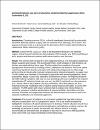Dumping Syndrome: case series of uncommon incidence following Laparoscopic Sleeve Gastrectomy (LSG)
| المؤلف | Elsherif, Mohamed |
| المؤلف | Hanna, Fahad |
| المؤلف | Asal, Sama Abdullrazaq |
| المؤلف | Mustafa, Isra |
| المؤلف | Elhag, Wahiba |
| تاريخ الإتاحة | 2017-09-12T08:45:20Z |
| تاريخ النشر | 2017-09-15 |
| اسم المنشور | Overcoming Obesity 2017 |
| الاقتباس | Elsherif, Mohamed; Hanna, Fahad; Asal, Sama Abdullrazaq; Mustafa, Isra; Elhag, Wahiba "Dumping Syndrome: case series of uncommon incidence following Laparoscopic Sleeve Gastrectomy (LSG)" Overcoming Obesity 2017, September 15-17, San Antonio, Texas |
| الملخص | Introduction: Dumping syndrome (DS) is a clinical impediment characterized by postprandial discomfort following bariatric-surgery. Data on incidence of DS following LSG is scarce. The purpose of this case series is to demonstrate the observation of DS in Qatari patients following Laparoscopic Sleeve Gastrectomy (LSG). Methods: Cases from the outpatients’ clinic at the department of bariatric and metabolic surgery- Hamad General Hospital, who had undergone LSG during the year 2016 were followed up for progress and data were analyzed and treatment options were discussed. Results: Five women under the age of 45 were diagnosed with DS. The first patient experienced fatigue, weakness and syncope. The second patient had a chief complaint of mild dizziness and diarrhea associated with low blood sugar. The third patient had complaints of recurrent hypoglycemia characterized by sweating, tremors, palpitations and dizziness. The fourth patient experienced significant dizziness associated with eating sweat, fatigue and low blood sugar within the first 40 minutes after meal with symptoms being relieved temporarily by sugary food. The fifth patient was presented to the emergency department with severe hypoglycemia, severe hypokalemia, fatigue, nausea, food intolerance and abdominal cramps. The majority of patients had mild-moderate symptoms with only one case presenting with severe symptoms that required hospitalization (5th patient) as blood sugar was very low (36-45 mg%) with very low potassium (2-2.5 mmol). None of the 5 patients had any comorbidity. Of the five patients, the first 4 responded to the diet modification with 2 required adding Acarbose oral tablets to control their symptoms. The fifth patient with severe symptoms had to undergo more intense therapy to control the symptoms, including administration of intravenous fluids, electrolytes correction, Acarbose, Octreotide and symptomatic treatment for abdominal pain and nausea as well as the usual diet modification and nutritional supplement. Conclusion: DS in post-LSG patients is an uncommon condition that may lead to serious deficiency complications such as hypoglycemic attacks. This is yet another example that highlights the importance of patient education prior to discharge. Patients education should focus on raising the awareness of such potential complications and healthcare providers must have the knowledge and expertise to predict and deal with such ailment. While it is strongly recommended that alternative diets are adopted to help with the recovery of afflicted patients, severe cases of DS may require medication to treat critical cases. |
| راعي المشروع | Hamad Medical Corporation |
| اللغة | en |
| الموضوع | Laparoscopic sleeve gastrectomy Bariatric Surgery Dumping Syndrome Hypoglycemia |
| النوع | Poster |
الملفات في هذه التسجيلة
هذه التسجيلة تظهر في المجموعات التالية
-
الصحة العامة [475 items ]



